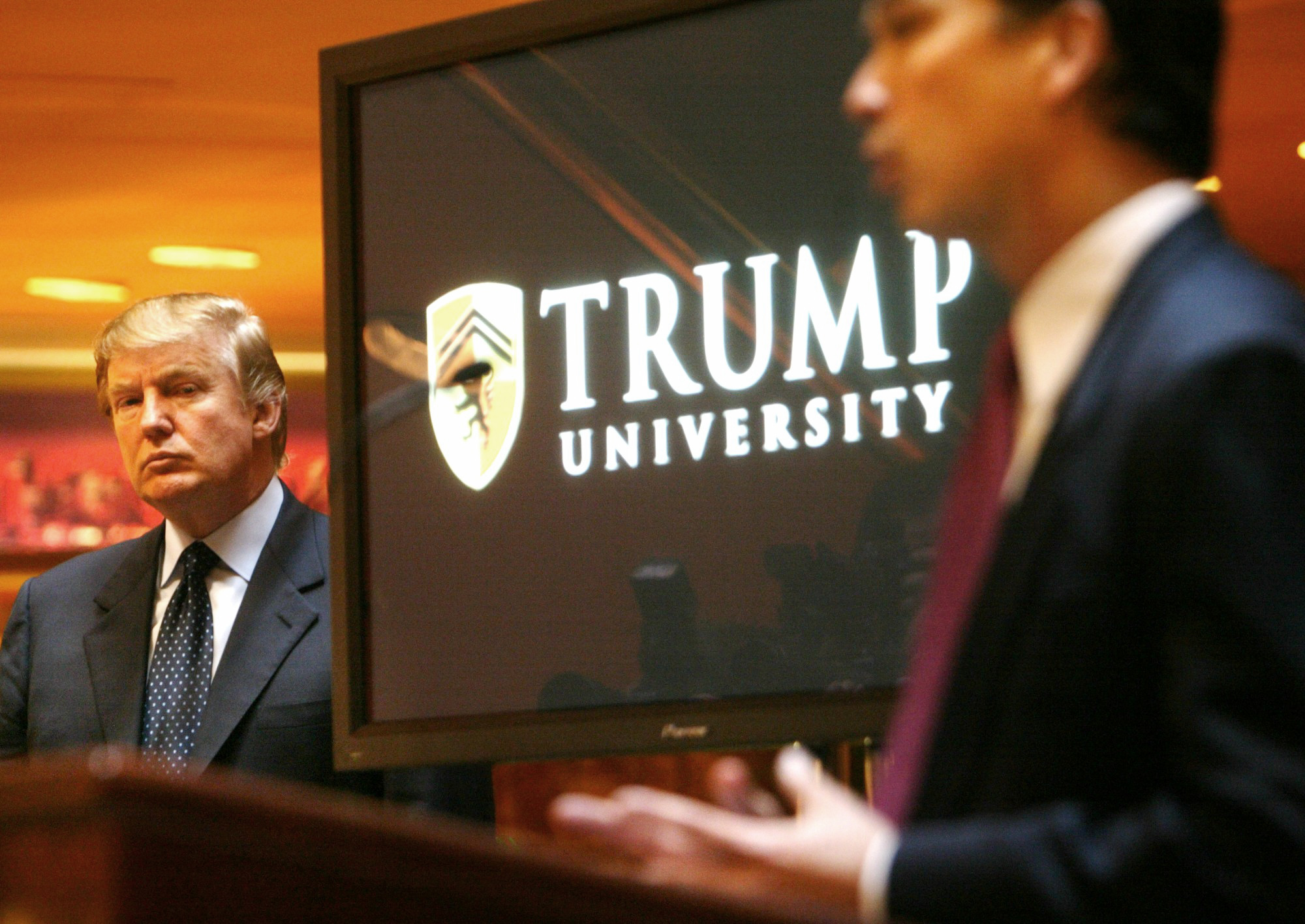
The fate and reputation of Trump University, the adult education courses that carried Donald Trump’s name from 2005 to 2010, have become the fight in the free-for-all that is the Republican primary contest.
But the debate could have bigger consequences than previous arguments over whether Mexico will pay to build a bigger wall at its border or the size of a candidate’s manhood. At stake, is a potential lawsuit with more than 7,000 plaintiffs likely to be granted the right to sue the billionaire candidate who say they were misled into spending thousands of dollars on courses that were ultimately without value. The Better Business Bureau on Tuesday said that Trump University had a D- score that eventually rose to A+ only when it began to shut down and older complaints expired.
In a 2015 interview with Steven Brill, Trump said the courses were “fantastic” and that he’s “dying to go to court” to defend them. Here are six key facts from Brill’s investigation, published in the Nov. 16 issue of TIME.
1. Trump is misleading voters about the program’s approval ratings.
Donald Trump maintains that the program had a 98% approval rating. In a sworn affidavit with a San Diego court filed in 2013, Trump’s director of operations Mark Covais said the company had issued 2,144 refunds to 6,698 attendees of the $1,495 three-day program, or 32%. The refund rate for a $34,995 program, Brill reports, was 16% percent.
2. Trump promised students he handpicked his teachers. He did not.
In a promotional video for the program, Trump said the program’s mentors would be “handpicked by me.” But, Brill writes, court documents tell a different story. Michael Sexton, who was hired to be president of Trump University, testified in a 2012 pretrial deposition that “none of our instructors…were handpicked by Donald Trump.”
3. Teachers were instructed to pretend they knew Trump even when they didn’t.
Trump University administrators created scripts for teachers, instructing them on what to say to their students. According to those scripts, teachers were told to tell students that they had a close association with Trump, Brill writes. “I remember one time Mr. Trump had us over for dinner,” a script distributed to teachers read, after which a instructor was supposed to recount how Trump had confided some nugget of real estate wisdom to him. “No, I didn’t have dinner with him,” conceded one instructor, when questioned in a 2013 deposition about a recorded presentation in which he mouths the script’s dinner-with-Trump line. “I was just trying to be as close to the [script] as possible.” “I don’t know who you’re talking about,” Trump told Brill when asked about the instructor’s dinner tale. “But I will tell you I met many of the professors, and I also studied just about all the résumés. I’m very much into academics. You know, I was a good student.”
4. Teachers were told to use “buzzwords” that made the program appear “elitist.”
According to marketing materials created for Trump University, Brill writes, the teachers were always to be called “faculty.” A crest that looked like it was borrowed from Yale or Harvard was embedded in the logo. An “admissions department” was listed on the website. The marketing guidelines had sections called “catchphrases/buzzwords” and “tone” that encouraged the use of language such as “elitist,” “Ivy League” and “Think of Trump University as a real university with a real admissions process–i.e., not everyone who applies is accepted.”
5. A $34,995 mentorship program was worth “nothing,” one participant said.
Boyce Chait, 84, and his wife Evelyn, 80, who live in New Jersey, demanded but were refused a refund after their $34,995 mentorship proved, Boyce told Brill, “to be worth nothing. When it came to the nitty-gritty, there was nothing there.” (Nonetheless, Boyce told Brill he and his wife would still “vote for Trump over Hillary Clinton,” because they said they are members of the Tea Party.)
6. Another participant went into debt to take a $25,000 course at Trump University. Today he can’t afford his own home.
Kevin Scott, 46, told Brill that he sat in on a free 90-minute presentation at a hotel in Westchester County, New York, in 2008. He then enrolled in the $1,495 course where he was persuaded to buy a $25,000 Elite package. “It all amounts,” Scott said, to a “whole lot of nothing. I ended up being one of those distressed properties; I now have to rent out my house and live in a small apartment.” Scott is now one of what are likely to be nearly 7,000 plaintiffs in the class actions. On Monday, Trump released a video where the candidate held up what he said was Scott’s positive evaluation of the courses.
As Brill points out, federal Ninth Circuit Court of Appeals Judge Kim Wardlaw has ruled that the fact that one of the named plaintiffs filled out a positive survey after the class is not persuasive of the class’s value because “the recent Ponzi-scheme scandals involving onetime financial luminaries like Bernard Madoff … demonstrate [that] victims of con artists often sing the praises of their victimizers until the moment they realize they have been fleeced.”
More Must-Reads from TIME
- Cybersecurity Experts Are Sounding the Alarm on DOGE
- Meet the 2025 Women of the Year
- The Harsh Truth About Disability Inclusion
- Why Do More Young Adults Have Cancer?
- Colman Domingo Leads With Radical Love
- How to Get Better at Doing Things Alone
- Michelle Zauner Stares Down the Darkness
Contact us at letters@time.com